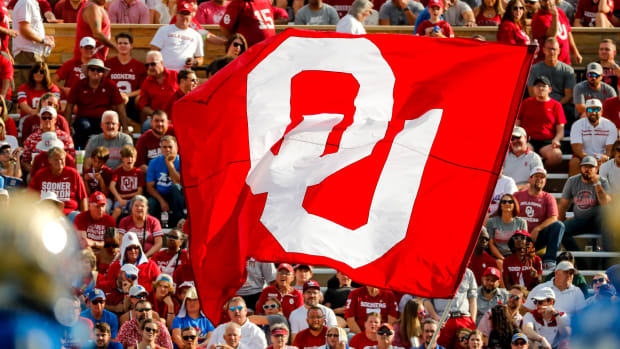How Bringing in BYU Solves Every Big 12 Scheduling Dilemma
So, August has arrived and the 2020 college football season has become a scheduling frenzy — every conference for itself.
The Big Ten went rogue weeks ago now, and the Pac-12 quickly followed the B1G’s lead.
That didn’t sit well with the other Power 5 conferences, but then this week, the ACC and the SEC both decided to forge ahead — the ACC with a 10-game conference schedule plus one non-conference game, the SEC with a 10-game, conference-only schedule.
Which leaves the Big 12.
University of Oklahoma athletic director Joe Castiglione said during a radio interview Friday that the league could announce its 2020 scheduling model as early as Monday, if not soon thereafter.
The Big 12 will now miss all of its 11 schedule games against Power 5 opponents, including gems like Oklahoma-Tennessee and Texas-LSU. The Big 12 needs help — and has an immediate opening.
While it may be just a pipe dream — and a late one, at that — there is an attractive solution for the Big 12: BYU.
The Cougars are independent, no conference affiliation, and obviously have a lot of scheduling flexibility this year, as they’ve already had games canceled against Utah, Michigan State, Arizona State, Minnesota, Missouri and Stanford.
That’s just BYU’s Power 5 opponents.
Its other games against Utah State, Houston, Northern Illinois, Boise State, San Diego State and North Alabama could also be in jeopardy, but this time it's BYU who would prefer to be in control of its own fate.
Since the Cougars need games, and since the Big 12 doesn’t want to have to play an opponent twice in the regular season, or finish with just nine games, or settle for an inequitable strength of schedule, why not do what the ACC did with Notre Dame and make BYU an honorary, one-year member of the Big 12?
It’s certainly not ideal for BYU’s Group of 5 opponents, but that’s life in a pandemic.
And it builds in a natural solution to the Big 12’s potential scheduling glitches. Some schools have FCS opponents slated. Some have more challenging road games. Some would have open dates stacked up, some would have a long run of games on consecutive weekends. Some have five home games, and some have four.
Why not instead standardize the 2020 schedule as much as possible by adding an 11th member and everybody playing the same 10 teams?
BYU’s 2020 Big 12 schedule
- Aug. 29: at Texas
- Sep. 5: OPEN
- Sep. 12: Texas Tech
- Sep. 19: at West Virginia
- Sep. 26: Kansas
- Oct. 3: OPEN
- Oct. 10: at Baylor
- Oct. 17: TCU
- Oct. 24: OPEN
- Oct. 31: at Oklahoma State
- Nov. 7: Oklahoma
- Nov. 14: OPEN
- Nov. 21: Iowa State
- Nov. 28: at Kansas State
- DEC. 5: OPEN
Start with the numbers: 10 games spread over 15 Saturdays, from Week 0 (Aug. 29) to Week 14 (Dec. 5), although there’s been much discussion about adding yet another week and pushing the regular-season finales to Dec. 12 — 16 weeks in all.
Try to keep the Thursday and Friday matchups where they are for TV purposes, and build around that if possible. With the final games on Dec. 12 and the Big 12 championship game pushed back to Dec. 19 (essentially what the Pac-12 announced on Friday), that would give every Big 12 team seven open dates to cope with positive COVID-19 test results if they happen, and thus manage rosters.
To start, do away with all existing non-conference games. Simple as that. Let the FCS and Group of 5 opponents figure out their own schedules.
Then have as many teams as possible follow Oklahoma’s example and start on Aug. 29 if the players are ready. Kansas also currently has a game scheduled that day. Why not start the season right there — Oklahoma vs. Kansas?
Let BYU open that day as well, against Texas in Austin, just to pique everyone’s interest, and away we go.
After BYU gets an open date to assess its COVID-19 testing results, the Cougs get to host Texas Tech on Sept. 12.
West Virginia fills its existing Sept. 19 open date by hosting BYU.
After another open date, the Cougs visit Lawrence to fill Kansas’ opening on Sept. 26, then take another week off before traveling to Waco on Oct. 10 to fill Baylor’s open Saturday.
BYU is back home on Oct. 17 for a game against TCU. That pushes the Frogs’ home game with Kansas State into December.
BYU gets another open date, then visits Oklahoma State on Oct. 31, necessitating a move of the Cowboys’ scheduled home game with Texas Tech to Dec. 5 or later.
Oklahoma visits Provo on Nov. 7, pushing the Sooners’ trip to West Virginia back to December.
After BYU takes its fourth open date, Iowa State visits the Cougars on Nov. 21, which moves the Cyclones’ visit to Texas into December.
And BYU finishes its first (and probably only) season in the Big 12 by visiting Kansas State on Nov. 28, which would bump the Wildcats’ visit to Baylor to an earlier open date of their choice (both currently have four open dates available in August-September).
The December schedule — put them all on Dec. 5, space them out over the first two weekends, or keep it flexible — would be appealing: TCU-Kansas State, OSU-Texas Tech, OU-West Virginia and Iowa State-Texas.
That would allow for the Big 12 championship game to be played on Dec. 12, but the league could even move that back to Dec. 19 and leave Dec. 12 open for any make-up contests.
OSU, Texas, Baylor, West Virginia, Kansas and Kansas State all currently have four home games, so bringing in BYU gives those teams the ability add a home game so every team has five home games and five road games.
Teams could also agree to re-schedule games to accommodate the extra open dates or even leave dates open for added flexibility as needed, depending on how coaches need to manage rosters based on player availability.
Of course, BYU agrees to share equally in all league television revenue. And adding the Cougars fills out the conference’s required inventory of televised games, allowing everyone to get at least close to a full revenue share.
It’s a one-time solution to the Big 12’s big scheduling obstacles, but adding BYU for 2020 solves a lot of problems at once — and brings in an attractive football property to make the league more appealing for the College Football Playoff selection committee.
To get the latest OU posts as they happen, join the SI Sooners Community by clicking “Follow” at the top right corner of the page (mobile users can click the notifications bell icon), and follow SI Sooners on Twitter @All_Sooners.




